高中英语语法全套视频 高中英语词汇汇编(全套)
- 格式:doc
- 大小:26.50 KB
- 文档页数:9
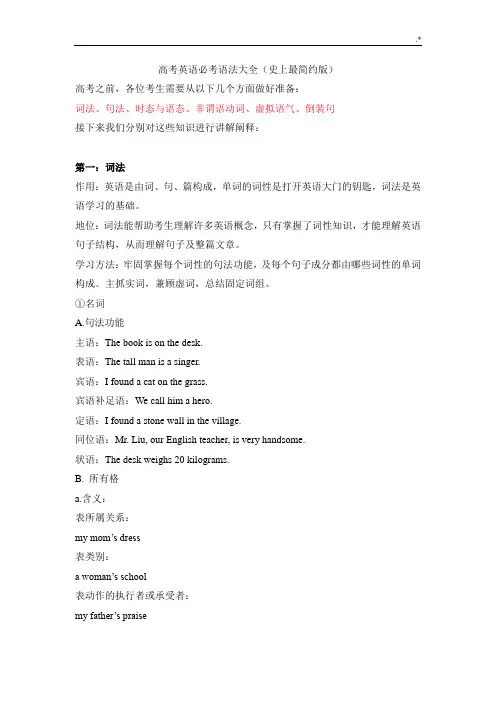
.*高考英语必考语法大全(史上最简约版)高考之前,各位考生需要从以下几个方面做好准备:词法、句法、时态与语态、非谓语动词、虚拟语气、倒装句接下来我们分别对这些知识进行讲解阐释:第一:词法作用:英语是由词、句、篇构成,单词的词性是打开英语大门的钥匙,词法是英语学习的基础。
地位:词法能帮助考生理解许多英语概念,只有掌握了词性知识,才能理解英语句子结构,从而理解句子及整篇文章。
学习方法:牢固掌握每个词性的句法功能,及每个句子成分都由哪些词性的单词构成。
主抓实词,兼顾虚词,总结固定词组。
①名词A.句法功能主语:The book is on the desk.表语:The tall man is a singer.宾语:I found a cat on the grass.宾语补足语:We call him a hero.定语:I found a stone wall in the village.同位语:Mr. Liu, our English teacher, is very handsome.状语:The desk weighs 20 kilograms.B. 所有格a.含义:表所属关系:my mom’s dress表类别:a woman’s school表动作的执行者或承受者:my father’s praise.*b.分类‘s所有格表有生命的my father’s carof所有格表无生命的the cover of the book双重所有格表部分概念或某种感情a friend of my sister’s②冠词不定冠词:a, an 表泛指,每一,类别,抽象名词具体化定冠词: the 表特指的人或物零冠词:表许多特殊含义和特殊用法③代词A人称代词主格:I you he she it we you they宾格:me you him her it us you themB 物主代词形容词性:my you’re his her its our you’re their名词性:mine yours his hers its ours yours theirsC 反身代词单数myself yourself himself herself itself复数ourselves yourselves themselvesD 相互代词each other one another each other’s one another’sE 指示代词this that these those such sameF 疑问代词who whom whose which whatG 连接代词who whom which what that whose whoever whomever whateverwhichever等H 关系代词who whom whose which that asI 不定代词注意:1. –body和-one同义2. –thing有两个意思:东西和事情3. some 有两个意思:一些和某一some book some books4. 不定代词的定语要后置J it的用法A用作代词a. 代上文提到的同一物b. 代上文的指示代词c. 代天气、时间、距离、环境等d. 代不清楚的一个人e. 代整个句子B. 形式主语It’s important for you to learn English well.C. 形式宾语Our boss made it clear that he would go abroad next month.D. 强调句型It is/was +主/宾/状+that/who +其余成分④数词A. 年月日时刻及年代表达法a.基本顺序是月、日、年b. 具体时刻用atc. 具体某一天用on举例:at 3:40 on Sep 1st, 2009 in Aug, 2004 in the 1980’sB. 分数构成:基数词/序数词分子大于1时,分母用复数a half a quarter five and four sixths注意:本身没有单复数,根据它所代替的名词而决定C.百分数构成:基数词+percent注意:本身没有单复数,根据它所代替的名词而决定。
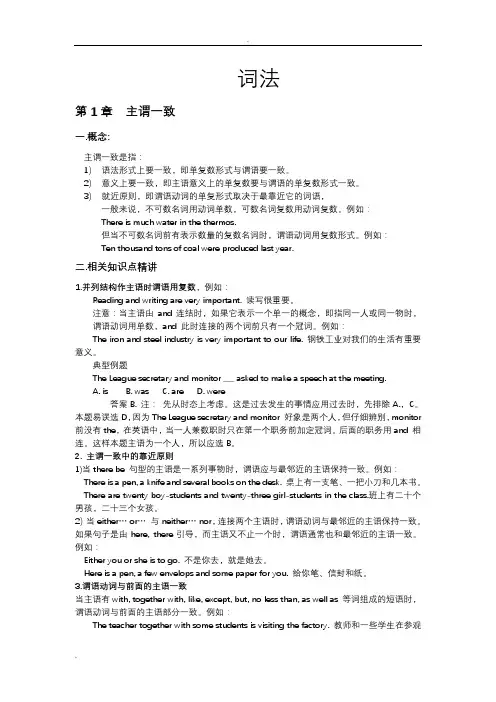
词法第1章主谓一致一.概念:主谓一致是指:1)语法形式上要一致,即单复数形式与谓语要一致。
2)意义上要一致,即主语意义上的单复数要与谓语的单复数形式一致。
3)就近原则,即谓语动词的单复形式取决于最靠近它的词语,一般来说,不可数名词用动词单数,可数名词复数用动词复数。
例如:There is much water in the thermos.但当不可数名词前有表示数量的复数名词时,谓语动词用复数形式。
例如:Ten thousand tons of coal were produced last year.二.相关知识点精讲1.并列结构作主语时谓语用复数,例如:Reading and writing are very important. 读写很重要。
注意:当主语由and连结时,如果它表示一个单一的概念,即指同一人或同一物时,谓语动词用单数,and 此时连接的两个词前只有一个冠词。
例如:The iron and steel industry is very important to our life. 钢铁工业对我们的生活有重要意义。
典型例题The League secretary and monitor ___ asked to make a speech at the meeting.A. isB. wasC. areD. were答案B. 注:先从时态上考虑。
这是过去发生的事情应用过去时,先排除A.,C。
本题易误选D,因为The League secretary and monitor 好象是两个人,但仔细辨别,monitor 前没有the,在英语中,当一人兼数职时只在第一个职务前加定冠词。
后面的职务用and 相连。
这样本题主语为一个人,所以应选B。
2. 主谓一致中的靠近原则1)当there be 句型的主语是一系列事物时,谓语应与最邻近的主语保持一致。
例如:There is a pen, a knife and several books on the desk. 桌上有一支笔、一把小刀和几本书。
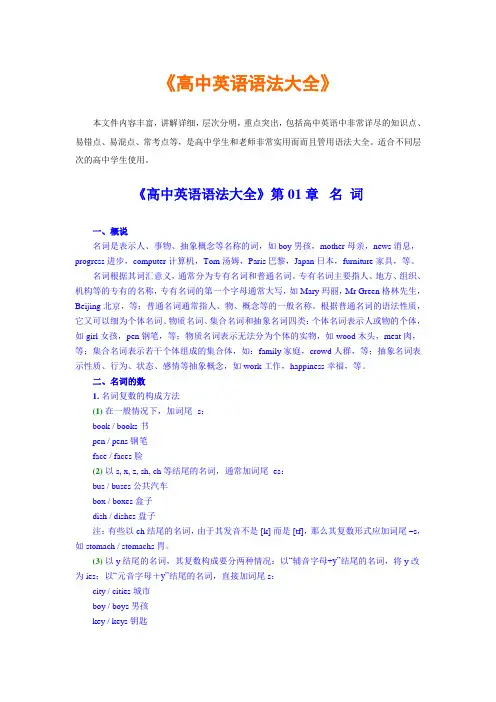
《高中英语语法大全》本文件内容丰富,讲解详细,层次分明,重点突出,包括高中英语中非常详尽的知识点、易错点、易混点、常考点等,是高中学生和老师非常实用而而且管用语法大全。
适合不同层次的高中学生使用。
《高中英语语法大全》第01章名词一、概说名词是表示人、事物、抽象概念等名称的词,如boy 男孩,mother 母亲,news 消息,progress 进步,computer 计算机,Tom 汤姆,Paris 巴黎,Japan 日本,furniture 家具,等。
名词根据其词汇意义,通常分为专有名词和普通名词。
专有名词主要指人、地方、组织、机构等的专有的名称,专有名词的第一个字母通常大写,如Mary 玛丽,Mr Green 格林先生,Beijing 北京,等;普通名词通常指人、物、概念等的一般名称。
根据普通名词的语法性质,它又可以细为个体名词、物质名词、集合名词和抽象名词四类:个体名词表示人或物的个体,如girl 女孩,pen 钢笔,等;物质名词表示无法分为个体的实物,如wood 木头,meat 肉,等;集合名词表示若干个体组成的集合体,如:family 家庭,crowd 人群,等;抽象名词表示性质、行为、状态、感情等抽象概念,如work 工作,happiness 幸福,等。
二、名词的数1.名词复数的构成方法(1)在一般情况下,加词尾 -s:book / books 书pen / pens 钢笔face / faces 脸(2)以 s, x, z, sh, ch 等结尾的名词,通常加词尾 -es:bus / buses 公共汽车box / boxes 盒子dish / dishes 盘子注:有些以 ch 结尾的名词,由于其发音不是 [k] 而是 [tf],那么其复数形式应加词尾–s,如stomach / stomachs 胃。
(3)以y 结尾的名词,其复数构成要分两种情况:以“辅音字母+y”结尾的名词,将 y 改为 ies;以“元音字母+y”结尾的名词,直接加词尾s:city / cities 城市boy / boys 男孩key / keys 钥匙注:以 y 结尾的专有名词,若在某些特殊情况下需要复数,通常加 s 构成:Mary / Marys 玛丽Germany / Germanys 德国(4)以 o 结尾的名词,有些加词尾 -s,有些加 -es,有些加 -s 或 -es 均可:piano / pianos 钢琴tomato / tomatoes 西红柿zero / zero(e)s 零注:有人对英语中所有以o结尾的名词作了统计,一共近200个,其中绝大部分的复数形式通过加词尾-s构成,少数加词尾 es。
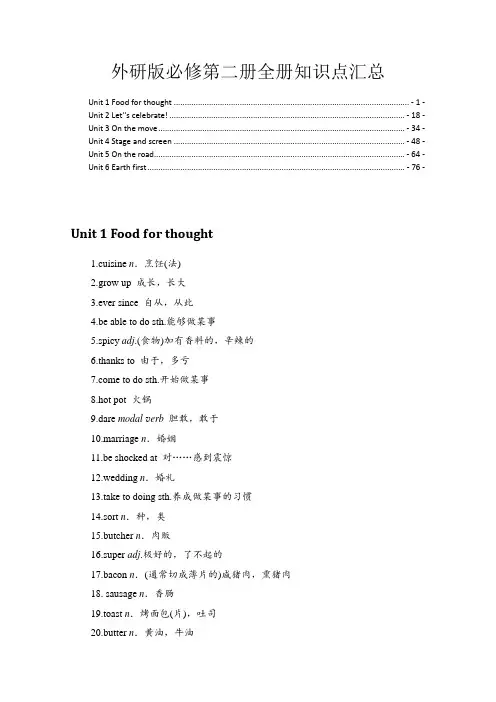
外研版必修第二册全册知识点汇总Unit 1 Food for thought ........................................................................................................... - 1 - Unit 2 Let''s celebrate! ........................................................................................................... - 18 - Unit 3 On the move ................................................................................................................ - 34 - Unit 4 Stage and screen ......................................................................................................... - 48 - Unit 5 On the road .................................................................................................................. - 64 - Unit 6 Earth first ..................................................................................................................... - 76 -Unit 1 Food for thought1.cuisine n.烹饪(法)2.grow up 成长,长大3.ever since 自从,从此4.be able to do sth.能够做某事5.spicy adj.(食物)加有香料的,辛辣的6.thanks to 由于,多亏e to do sth.开始做某事8.hot pot 火锅9.dare modal v erb胆敢,敢于10.marriage n.婚姻11.be shocked at 对……感到震惊12.wedding n.婚礼13.take to doing sth.养成做某事的习惯14.sort n.种,类15.butcher n.肉贩16.super adj.极好的,了不起的17.bacon n.(通常切成薄片的)咸猪肉,熏猪肉18.sausage n.香肠19.toast n.烤面包(片),吐司20.butter n.黄油,牛油21.get sb./sth.into...使某人/某物进入……22.typical adj.典型的,有代表性的23.had better (not) do sth.最好(不)做某事24.suffer v.(身体或精神上)受苦※suffer from 遭受……之苦25.according to 按照,根据26.encourage sb.to do sth.鼓励某人做某事27.deal with 应付,处理e across 偶遇,偶然发现29.stinky adj.难闻的,有臭味的30.tofu n.豆腐31.horrible adj.糟糕的32.gather v.聚集33.bite n.咬※take/have a bite 咬一口34.remind sb.of...使某人想起……35.cheese n.干酪,奶酪36.fall in love with 爱上,喜欢37.someday 将来有一天,有朝一日38.poison n.毒素,毒物,毒药39.feel at home with 对……感到舒适自在40.cross-cultural adj.跨文化的41.oolong n.乌龙茶42.china n.瓷,瓷料Words and Phrases知识要点1diet n.日常饮食vi.按照医生的规定饮食(教材P5)If you d are not try a “painful” diet to stay healthy,this new app is the perfect solution—and you needn't pay for it!如果你为了健康而不敢尝试一种“痛苦的”饮食,这个应用程序就是完美的解决方案——而且你不必付钱![例1]Everyone should try to reduce the amount of salt in our diet.大家都应该在饮食中减少盐的摄入量。
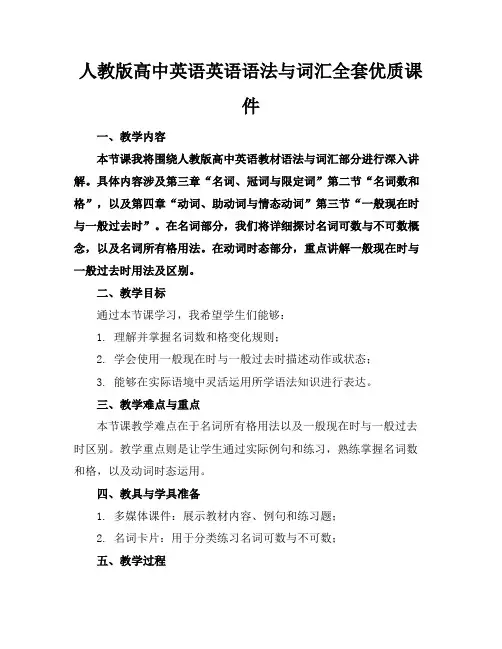
人教版高中英语英语语法与词汇全套优质课件一、教学内容本节课我将围绕人教版高中英语教材语法与词汇部分进行深入讲解。
具体内容涉及第三章“名词、冠词与限定词”第二节“名词数和格”,以及第四章“动词、助动词与情态动词”第三节“一般现在时与一般过去时”。
在名词部分,我们将详细探讨名词可数与不可数概念,以及名词所有格用法。
在动词时态部分,重点讲解一般现在时与一般过去时用法及区别。
二、教学目标通过本节课学习,我希望学生们能够:1. 理解并掌握名词数和格变化规则;2. 学会使用一般现在时与一般过去时描述动作或状态;3. 能够在实际语境中灵活运用所学语法知识进行表达。
三、教学难点与重点本节课教学难点在于名词所有格用法以及一般现在时与一般过去时区别。
教学重点则是让学生通过实际例句和练习,熟练掌握名词数和格,以及动词时态运用。
四、教具与学具准备1. 多媒体课件:展示教材内容、例句和练习题;2. 名词卡片:用于分类练习名词可数与不可数;五、教学过程1. 导入:通过展示一组图片,让学生描述图片中人物和物品,自然引入名词数和格概念;2. 讲解:详细讲解名词可数与不可数,以及名词所有格用法;接着讲解一般现在时与一般过去时用法及区别;3. 例题讲解:用多媒体课件展示例句,引导学生分析句子结构,讲解语法点;4. 随堂练习:让学生分组进行名词卡片分类练习,巩固名词数和格;同时,进行动词时态填空练习,加强学生对一般现在时与一般过去时掌握;6. 互动环节:邀请学生上台展示练习成果,鼓励大家互相交流学习心得。
六、板书设计1. 名词数和格:可数名词:有单数和复数两种形式;不可数名词:没有复数形式;名词所有格:表示所属关系,通常在名词后加“'s”。
2. 动词时态:一般现在时:描述经常发生动作或状态;一般过去时:描述过去发生动作或状态。
七、作业设计1. 作业题目:请用一般现在时描述你日常活动;请用一般过去时描述你昨天做一件事情。
2. 答案:My daily activities: I wake up at 6:00 a.m. every day.I have breakfast, go to school, and study English.What I did yesterday: I went to the library yesterday and borrowed a book about grammar.八、课后反思及拓展延伸本节课结束后,我将关注学生学习反馈,及时调整教学方法。
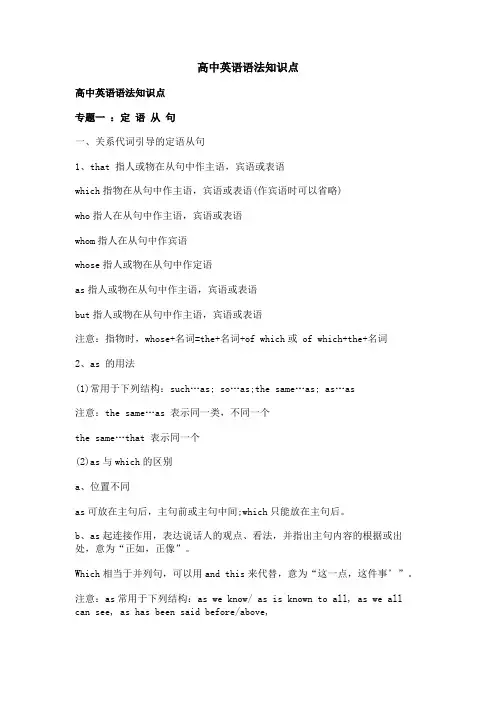
高中英语语法知识点高中英语语法知识点专题一:定语从句一、关系代词引导的定语从句1、that 指人或物在从句中作主语,宾语或表语which指物在从句中作主语,宾语或表语(作宾语时可以省略)who指人在从句中作主语,宾语或表语whom指人在从句中作宾语whose指人或物在从句中作定语as指人或物在从句中作主语,宾语或表语but指人或物在从句中作主语,宾语或表语注意:指物时,whose+名词=the+名词+of which或 of which+the+名词2、as 的用法(1)常用于下列结构:such…as; so…as;the same…as; as…as注意:the same…as 表示同一类,不同一个the same…that 表示同一个(2)as与which的区别a、位置不同as可放在主句后,主句前或主句中间;which只能放在主句后。
b、as起连接作用,表达说话人的观点、看法,并指出主句内容的根据或出处,意为“正如,正像”。
Which相当于并列句,可以用and this来代替,意为“这一点,这件事’”。
注意:as常用于下列结构:as we know/ as is known to all, as we all can see, as has been said before/above,as might be excepted, as is often the case, 一般不能用which代替as。
c、在从句中作主语时,which既可作系动词be的主语也可作实义动词的主语,而as只可作系动词be的主语。
二、只用that不用which的情况1、.先行词为 all , much, everything, nothing , something ,anything, nothing, none, the one等不定代词时2、先行词被only, any, few, little, no , all, just , very ,right等修饰时.3、当先行词是最高级或被形容词最高级修饰时。

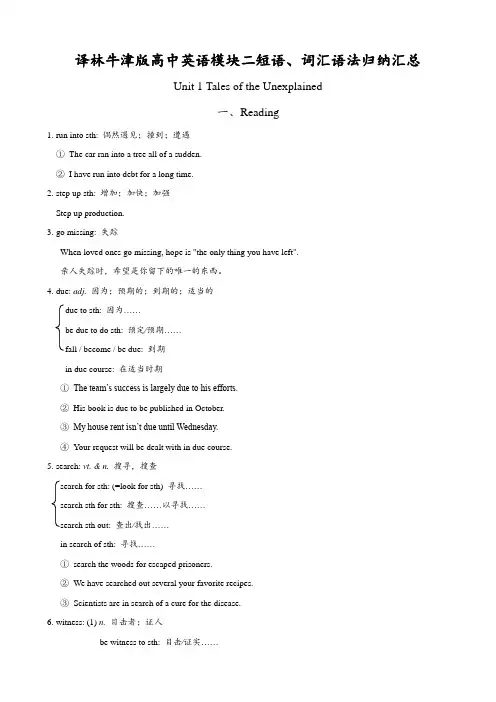
译林牛津版高中英语模块二短语、词汇语法归纳汇总Unit 1 Tales of the Unexplained一、Reading1. run into sth: 偶然遇见;撞到;遭遇①The car ran into a tree all of a sudden.②I have run into debt for a long time.2. step up sth: 增加;加快;加强Step up production.3. go missing: 失踪When loved ones go missing, hope is "the only thing you have left".亲人失踪时,希望是你留下的唯一的东西。
4. due: adj. 因为;预期的;到期的;适当的due to sth: 因为……be due to do sth: 预定∕预期……fall / become / be due: 到期in due course: 在适当时期①The team’s success is largely due to his efforts.②His book is due to be published in October.③My house rent isn’t due until Wednesday.④Your request will be dealt with in due course.5. search: vt. & n.搜寻,搜查search for sth: (=look for sth) 寻找……search sth for sth: 搜查……以寻找……search sth out: 查出∕找出……in search of sth: 寻找……①search the woods for escaped prisoners.②We have searched out several your favorite recipes.③Scientists are in search of a cure for the disease.6. witness: (1) n. 目击者;证人be witness to sth: 目击∕证实……We were witness to the accident.(2) vt.目击,见证This year has witnessed the rapid development of China’s economy.7. put on sth: (1) 穿上:put on your coat (2) 播放:put on a record(3) 上演,举行:put on a concert (4) 增加:put on weight8. Standing inside lots of strange creatures wit white……(Page 2, Lines 36-38)表示方位的副词、名词短语、形容词短语、介词短语放在句首,而且主语是名词时,句子完全倒装。

高中词汇高中英语词汇学习初中段单词1500词高中段选修单词1000高中段必修单词1000高中词汇结构0123认识单词音,形,义使用单词常用搭配,短语例句解析记忆单词一些简单的单词记忆的方法0课堂学习课后复习背诵彻底掌握单词1 Unit Onea-ban-dona表示不,ban 表示禁止not ban 不再禁止=放弃禁止they have abandoned theship.•abandon doing something 放弃做某事 =quit doing •abandon oneself to(介词) +sth …沉湎于…..., 纵情于…….He abandons himself to reading books every night.aboard adv& prep 在船(飞机,车)上,上船,上飞机•a+board = a(on)+board (板,引申为甲板)•welcome aboard 欢迎登机•get/be aboard登/上机,船,车等abnormal /æb'nɔːml/ adj 不正常的,反常的;变态的ab(否定前缀)+normal(正常的)•This warm weather is abnormal for February. •二月里这种温暖的天气不太正常.absence /'æbs(ə)ns/ n 缺席,不在,离开;一次缺席,不在的时间;缺乏,不存在ab-s-ent adj 缺席的,不在场的<->pre(前)-s-ent adj 出席的s=esse 表示存在absence <-> presence n 出席absence /'æbs(ə)ns/ n 缺席,不在,离开;一次缺席,不在的时间;缺乏,不存在be absent from… 不参加……Absence of mind 心不在焉His absence of mind during driving nearly caused an accident.他驾车时心不在焉,差点肇事。
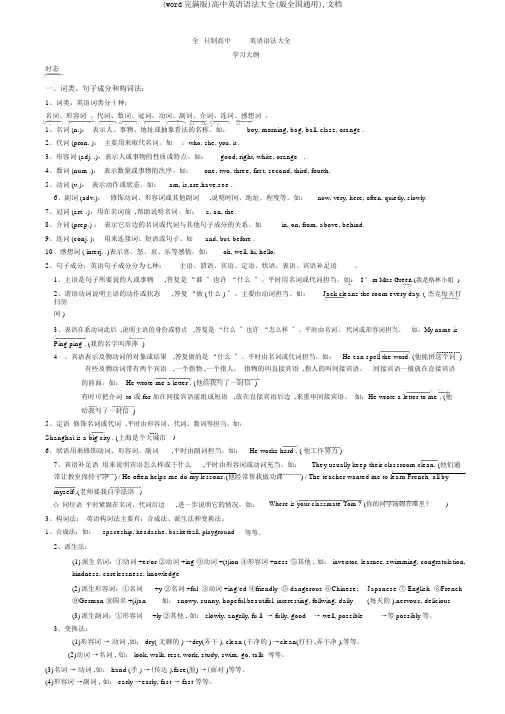
(word完满版)高中英语语法大全(版全国通用),文档全日制高中英语语法大全学习大纲时态一、词类、句子成分和构词法:1、词类:英语词类分十种:名词、形容词、代词、数词、冠词、动词、副词、介词、连词、感想词。
1、名词 (n.):表示人、事物、地址或抽象看法的名称。
如:boy, morning, bag, ball, class, orange .2、代词 (pron. ):主要用来取代名词。
如:who, she, you, it .3、形容词 (adj. .):表示人或事物的性质或特点。
如:good, right, white, orange .4、数词 (num .):表示数量或事物的次序。
如:one, two, three, first, second, third, fourth.5、动词 (v.):表示动作或状态。
如:am, is,are,have,see .6、副词 (adv.):修饰动词、形容词或其他副词,说明时间、地址、程度等。
如:now, very, here, often, quietly, slowly.7、冠词 (art. .):用在名词前 ,帮助说明名词。
如:a, an, the.8、介词 (prep.) :表示它后边的名词或代词与其他句子成分的关系。
如in, on, from, above, behind.9、连词 (conj. ):用来连接词、短语或句子。
如and, but, before .10、感想词 ( interj. .)表示喜、怒、哀、乐等感情。
如:oh, well, hi, hello.2、句子成分:英语句子成分分为七种:主语、谓语、宾语、定语、状语、表语、宾语补足语。
1、主语是句子所要说的人或事物,答复是“谁〞也许“什么〞。
平时用名词或代词担当。
如:I ’ m Miss Green.(我是格林小姐 )2、谓语动词说明主语的动作或状态,答复“做 (什么 ) 〞。

高中英语语法全英详解无水印IMB standardization office【IMB 5AB- IMBK 08- IMB 2C】必修一语法点一:Be+表将来 use the present continuous tense for future plans In English, we have lots of ways of talking about the future. The most common ways of talking about the future we encounter use ‘will’ or ‘be going to’ followed by an infinitive (动词原形), and we tend to use ‘be going to’ most often for talking about future plans.Sometimes, we also use the present continuous tense to talk about future plans.Ex. ①we are going to Mexico next Sunday.② Are you coming to the cinema?③ He is leaving for London in two hours.④ We are spending next winter in Australia.Only some verbs can be used in this situation, such as: go, arrive, come, leave, start, stay, return, play, have, work, wear, spend, see, meet, etc.扩展:What’s the difference between using ‘be going to’ and the present continuous to talk about future plans Let’s look at some more examples:“I’m going to play football on Saturday”You have made a plan in your head but possibly not taken any real action to confirm it. Also, playing football on Saturday is probably not a regular event for you.“I’m playing football on Saturday”You have made a plan and taken some real action to confirm it . called your friends or booked a place to play). In this case, it’s likely that playing football on Saturdays is a common activity for you.语法点二:Direct speech and indirect speech(直接引语和间接引语)Let's first define the terms, then look at how to talk about what someone said, and how to convert speech from direct to indirect or vice-versa.You can answer the question What did he say? in two ways:by repeating the words spoken (direct speech)by reporting the words spoken (indirect or reported speech).Direct speech repeats, or quotes, the exact words spoken. When we use direct speech in writing, we place the words spoken between quotation marks (" ") and there is no change in these words.Reported or indirect speech is usually used to talk about the past, so we normally change the tense of the words spoken. We use reporting verbs like 'say', 'tell', 'ask', and we may use the word 'that' to introduce the reported words. Quotation marks are not used.1、declarative sentence陈述句①Change in pronoun: The pronoun (subject) of the reported speech is changed according to the pronoun of reporting verb or object (person) of reporting verb (first part of sentence). Sometimes the pronoun may not change.In following example the pronoun of reported speech is “I” which will be ch anged in indirect speech into the pronoun (Subject) of reporting verb that is “he”.He said, “I like it very much.”→He said that he liked it very much.②Change in tense: If the first part of sentence (reporting verb part) belongs to past tense the tense of reported speech will change. If the first part of sentence (reporting verb part) belongs to present or future tense, the tense of reported speech will not change.③Change in demonstrative pronoun指示代词, temporal adverbial时间状语, adverbial of place地点状语 and verbs.Ps:(1)if the direct speech indicates objective truth, then there is no change in tense when it’s converted to indirect speech.Ex. He said, “Light travels much faster than sound.”→He said that light travels much faster than sound.(2) 如果在当地转述,here不必改成there,come不必改为go,如果在当天转述,yesterday, tomorrow等时间状语也不必改变。
高中英语(必修3)重点词汇、短语、句型、语法全汇总学习的脚步永不停歇,下面是小编为同学们整理的人教版高中英语(必修3)重点词汇、短语、句型、语法全汇总!一起来学习吧~ 高中英语(必修3)重点词汇、短语、句型、语法全汇总Unit1 Festivals around the world重点词汇1.take place 发生2.religious 宗教的3.in memory of 纪念4.belief 信任,信心,信仰5.dress up 盛装,打扮6.trick 诡计,窍门7.play a trick on 搞恶作剧,诈骗8.gain 获得9.gather 搜集,集合10.award 奖品,授予11.admire 赞美,钦佩12.look forward to 期望,盼望13.day and night 日夜14.as though 好像15.have fun with 玩的开心16.permission 许可,允许17.turn up 出现,到场18.keep one's word 守信用19.hold one's breath 屏息20.apologize道歉21.obvious 显然的22.set off 出发,动身,使爆炸重点短语1.mean doing sth. 意味着mean to do sth. 打算或企图做某事mean sb. to do sth. 打算让某人做某事be meant for 打算作……用; 为…而有2.take place 发生;举行3.of all kinds 各种各样的4.starve to death 饿死be starved of 缺乏starve for sth, starve to do 渴望5.plenty of 大量; 充足6.be satisfied with对......感到满意to one's satisfaction令某人感到满意7.do harm to sb.=do sb. harm 伤害某人8.in the shape of 呈…的形状,以…的形式9.in memory of/ to the memory of sb.纪念某人10.dress up 穿上最好的衣服;打扮,化装11.award sth.(to sb.)和award sb.sth.(for sth.) 颁奖reward sb. for sth. 因…奖赏某人reward sb. with sth. 用某物酬劳某人12.admire sb. for sth在某方面钦佩某人13.look forward to期望,期待,盼望14.have fun with(与某人)玩得开心;过得快乐( have a good time;enjoy oneself.)15. turn up 出现;调大/高turn down 拒绝;调小/低turn off 关掉turn on 打开turn out 结果是......turn to sb. for help 向某人求助16.keep one's word 守信用break one's word, 失信17.It be obvious that-clause显而易见;一目了然18.set off 出发; 使(地雷、炸弹)爆炸set in 开始set up 建立,创立set out to do = set about doing sth. 着手做set down 写下,记下19.remind sb. of sth. 提醒,使想起重点句型1.Please make sure when and where the accident took place.请查清楚事故是何时何地发生的。
高中英语语法知识点总结高中英语语法知识点总结语法是英语里面最难去也是最重要的一部分,升上高中,我们要学习和掌握的语法知识变得更多更难了。
下面是店铺为大家整理的高中英语语法知识归纳,希望对大家有用!高中英语语法知识归纳名词性从句重难点1. 在名词性从句中,疑问句要用陈述句的语序。
例如:①Can you make sure ____the gold ring ?(MET90)A.where Alice had put D.where has Alice put2. 动词 doubt 用在疑问句或否定句中,其后宾语从句常用 that 作连接词;用在肯定句中,连接词用 whether 或 if 皆可,而不用 that。
3. 否定转移问题。
①将think, believe, suppose, expect, fancy, guess, imagine等动词后面跟宾语从句时否定转移我想我并不认识你。
我相信他不回来。
We dont expect he will come tonight , will he ?注意:若谓语动词为hope,宾语从句中的否定词不能转移。
I hope you werent ill. 我想你没有生病吧。
②将seem, appear 等后的从句的否定转移看来他们不知道往哪去。
看来我们明天不会碰上好天气。
4. 主谓一致问题。
. .5. 语气问题① 在含有 suggest , order , demand , propose , command , request , insist, desire, require, advise 等表示要求、命令、建议、决定等意义的动词后,that从句常用“should+ 动词原形”的结构我建议我们应该立刻出发。
② 在It is +过去分词+that的主语从句中 decided,demanded,desired,insisted,ordered,proposed,suggested,recommended,requested, required等。
高中英语必修四第1-5单元重点词汇及语法(完整版)-CAL-FENGHAI.-(YICAI)-Company One1Unit 1 Women of achievement1.achieve v. 完成,达到;实现,获得achievement:n.完成;达到;成绩;成就e.g He will never achieve anything if he doesn’t work hard.不努力工作他什么也做不成。
The company has achieved a 100% increase in profitability.这个公司在利润方面获得了百分之百的增长We felt a great sense of achievement when we reached the top of the mountain.当我们到达山顶的时候,我们有一种很大的成就感。
2.connection: 联系;关系;连接物;连接,联结(with/between) Pl. 亲属;亲戚e.g There is a strong connection between smoking and heart disease.吸烟和心脏病之间有很大的联系。
The company has a connection with a number of Japanese firms.这个公司和日本的好多公司有联系。
This town has very good road and railway connections with the coast.这个小镇和海岸之间有着很好的公路及铁路连接。
She ‘s English but she has Irish connections.她是英格兰人但她有爱尔兰的亲戚。
in connection with: 有关e.g In connection with your request of March 3, we are sorry to tell you that we can’t give you a reply until the manager comes back next week.关于你三月三日的请求,很抱歉地告诉你直到下周经理回来我们才能给你答复。
高中英语语法归纳总结一、名词【知识精讲】名词是表示人,事物,地点或抽象概念的名称的词。
一、名词的数在熟悉可数名词单数变复数规则的基础上,突出以下几点:1. 以s结尾,仍为单数的名词(多为学科名词),如:physics, linguistics, mathematics, politics, statistics, news , the United States2. 抽象名词表示具体或特定的事例时也可作可数名词,单数前面应有不定冠词。
如:(1) pleasure, surprise, help, success, failure, danger, difficulty, wonder等意为“...的人/ 物”。
如:The meeting is a success.(2) worry, honor, disaster, rain, snow, fog, wind, gas, fire, crop, coffee, tea, food等不可数名词,指“一种”、“一场”及“多种”、“多场”时,可以有其单、复数形式。
如:There have been strong winds over the last two months.(3) a need, a discovery, a love, a good time, a collection of, a knowledge of, a history of, a population of, an area of, an understanding of等已形成固定形式。
如:He has a good practical knowledge of computer science.3. 表示一类事物的总称的名词,不能加-s ,如:machinery, furniture, equipment, technology, luggage, baggage, homework, evidence4. 一些名词单数和复数形式表达不同的意思,如:chicken鸡肉/ chickens小鸡; fish鱼肉/ fishes( fish )各种鱼; paper纸/ papers试卷; water水/ waters水域,room空间/ rooms 房间5. 只有复数形式的名词,如:glasses (眼镜),trousers, clothes,scissors等,注意加单位名词的用法:a pair of glasses; two pairs of trousers6. 一些名词形式上虽是单数,但表示的是复数含义,如:people , police, cattle, staff, public, the +adj., the + 分词;(表示一类人)7. 以复数形式出现,表达复数含义,如:belongings, surroundings, earnings, savings, shoes, socks, goods, thanks, congratulations, funds, pains, arms, troops8. 集合名词看成一个整体时,谓语用单数,若侧重各个成员,则用复数,如:audience,class,couple,crowd,family,group,government,public●The average family is a great deal smaller than it used to be.●My family are going with me.9. 单复数同形的名词,如:fish, deer, sheep, youth, Chinese, Japanese, means, species, crossroads, series, works, li(里), yuan(元), mu(亩)等●How many deer are there in Dafeng now?10. 合成名词构成复数时,通常只将里面所含的主体名词变为复数,如果没有主体名词,则将最后一个部分变为复数,如:sons-in-law, passers-by, story-tellers, breakfasts, housewives11. 不规则名词的“数”,如:woman -women, child-children, ox -oxen, tooth -teeth, goose -geese,foot -feet, mouse -mice, phenomenon-phenomena, analysis-analyses,12 .专有名词的“数”,如:史密斯一家人the Smiths 两个玛丽two Marys13. 非名词类词汇的“数”,如:缩写,数字,字母的复数常用加’s的方法来构成three a’s; two but’s; in one’s twenties; in the 1980’s(1980s)●Nothing is in good order but at sixes and sevens. 乱七八糟●You mightn’t as well use so many and’s in your conversation.14. 注意以下名词为不可数名词:advice, baggage, change(零钱), equipment, furniture, fun ,hair, homework, information, luggage, money, news, progress, traffic.二、名词所有格英语中有些名词可以加"'s"来表示所有关系,带这种词尾的名词形式称为该名词的所有格,1. 单数名词词尾加"'s",复数名词词尾没有s,也要加"'s",如:the boy's bag 男孩的书包,men's room 男厕所。
高中英语语法(精华版)目录高中英语语法总结大全之名词 (10)高中英语语法总结大全之名词 (10)名词概论 (10)其它名词复数的规则变化 (12)名词复数的不规则变化 (13)不可数名词量的表示 (14)定语名词的复数 (15)不同国家的人的单复数 (16)名词的格 (17)高中英语语法总结大全之代词 (18)人称代词的用法 (18)人称代词之主、宾格的替换 (19)代词的指代问题 (20)并列人称代词的排列顺序 (20)物主代词 (21)双重所有格 (22)反身代词 (22)相互代词 (24)指示代词 (25)疑问代词 (27)关系代词 (29)every, no, all, both,... (30)none, few, some, any,... (32)代词比较辩异one, that和it (34)one/another/the other (34)"the"的妙用 (35)anyone/any one;... (35)both, either, neither,... .. (36)many, much (37)few, little, a few,... .. (38)高中英语语法总结大全之冠词和数词 (39)不定冠词的用法 (39)定冠词的用法 (40)零冠词的用法 (41)冠词与形容词+名词结构 (43)冠词位置 (43)数词 (44)形容词及其用法 (46)以-ly结尾的形容词 (46)用形容词表示类别和整体 (47)多个形容词修饰名词的顺序 (47)副词及其基本用法 (49)兼有两种形式的副词 (50)形容词与副词的比较级 (51)as+形容词或副词原级+as (53)比较级形容词或副词+than (54)可修饰比较级的词 (55)many, old和far (56)the+最高级+比较范围 (56)和more有关的词组 (57)高中英语语法总结大全之动词 (58)动词 (58)系动词 (60)助动词be的用法 (63)助动词have的用法 (64)助动词do 的用法 (65)助动词shall和will的用法 (66)助动词should, would的用法 (66)短语动词 (67)非谓语动词 (68)高中英语语法总结大全之动词的时态 (69)一般现在时的用法 (69)一般过去时的用法 (70)used to/be used to (71)一般将来时 (72)be going to/will (73)be to和be going to (73)一般现在时表将来 (73)用现在进行时表示将来 (74)现在完成时 (74)比较过去时与现在完成时 (74)用于现在完成时的句型 (76)比较since和for (78)since的四种用法 (79)延续动词与瞬间动词 (79)过去完成时 (80)用一般过去时代替完成时 (82)将来完成时 (82)现在进行时 (82)不用进行时的动词 (83)过去进行时 (84)将来进行时 (85)一般现在时代替将来时 (86)一般现在时代替过去时 (86)一般现在时代替完成时 (87)一般现在时代替进行时 (87)现在进行时代替将来时 (87)时态一致 (88)时态与时间状语 (88)高中英语语法总结大全之动词的语态 (88)动词的语态 (88)let 的用法 (89)短语动词的被动语态 (90)表示"据说"或"相信"的词组 (90)不用被动语态的情况 (90)主动形式表示被动意义 (92)被动形式表示主动意义 (93)need/want/require/worth (93)高中英语语法总结大全之虚拟语气 (94)虚拟语气 (94)真实条件句 (94)非真实条件句 (95)混合条件句 (96)虚拟条件句的倒装 (97)特殊的虚拟语气词:should (98)wish的用法 (99)比较if only与only if (100)It is (high) time that (100)need"不必做"和"本不该做" (101)高中英语语法总结大全之情态动词 (101)情态动词的语法特征 (101)比较can 和be able to (102)比较may和might (103)比较have to和must (103)must表示推测 (104)表示推测的用法 (105)情态动词+have+过去分词 (106)should和ought to (107)had better表示最好 (107)would rather表示"宁愿" (107)will和would (108)情态动词的回答方式 (109)带to的情态动词 (110)比较need和dare (111)高中英语语法总结大全之动词不定式 (111)不定式作宾语 (111)不定式作补语 (113)不定式主语 (115)It's for sb/It's of sb (116)不定式作表语 (116)不定式作定语 (117)不定式作状语 (117)用作介词的to (118)省to 的动词不定式 (118)动词不定式的否定式 (119)不定式特殊句型too...to (121)不定式特殊句型so as to (121)不定式特殊句型Why not (122)不定式的时态和语态 (122)动名词与不定式 (123)高中英语语法总结大全之分词 (124)分词作定语 (124)分词作状语 (125)连词+分词(短语) (126)分词作补语 (126)分词作表语 (127)分词作插入语 (127)分词的时态 (127)分词的语态 (129)高中英语语法总结大全之独立主格 (129)独立主格 (129)With的复合结构 (130)高中英语语法总结大全之特殊词精讲 (132)stop doing/to do (132)forget doing/to do (133)remember doing/to do (133)regret doing/to do (134)cease doing/to do (134)try doing/to do (135)go on doing/to do (135)be afraid doing/to do (135)be interested doing/... (136)mean doing/to do (136)begin(start) doing/to do (137)感官动词 + doing/to do (137)高中英语语法总结大全之句子的种类 (138)句子的种类 (138)祈使句 (140)感叹句结构 (141)强调句结构 (143)用助动词进行强调 (144)反意疑问句 (144)高中英语语法总结大全之连词 (149)连词 (149)并列连词与并列结构 (149)比较and和or (151)表示选择的并列结构 (152)表示转折或对比 (152)表原因关系 (152)比较so和 such (153)高中英语语法总结大全之主谓一致 (154)主谓一致 (154)并列结构作主语谓语用复数 (154)主谓一致中的靠近原则 (155)谓语动词与前面的主语一致 (156)谓语需用单数 (156)指代意义决定谓语的单复数 (156)与后接名词或代词保持一致 (157)高中英语语法总结大全之名词性从句 (158)名词性从句 (158)引导名词性从句的连接词 (158)名词性that-从句 (159)名词性wh-从句 (161)if, whether引导的名词从句 (162)否定转移 (163)高中英语语法总结大全之状语从句 (164)地点状语从句 (164)方式状语从句 (164)原因状语从句 (166)目的状语从句 (166)结果状语从句 (167)条件状语从句 (167)让步状语从句 (168)比较while, when, as (170)比较until和till (170)表示"一...就..."的结构 (172)高中英语语法总结大全之定语从句 (172)定语从句 (172)关系代词引导的定语从句 (173)关系副词引导的定语从句 (174)判断关系代词与关系副词 (175)限制性和非限制性定语从句 (176)介词+关系词 (177)as, which非限定性定语从句 (177)先行词和关系词二合一 (179)what/whatever/that... .. (179)关系代词that的用法 (180)高中英语语法总结大全之倒装 (181)倒装句之全部倒装 (181)倒装句之部分倒装 (181)以否定词开头作部分倒装 (183)so, either, nor作部分倒装 (183)only在句首要倒装的情况 (184)as, though引导的倒装句 (184)其他部分倒装 (185)高中英语语法总结大全之名词词名词概论名词可以分为专有名词(Proper Nouns)和普通名词 (Common Nouns),专有名词是某个(些)人,地方,机构等专有的名称,如Beijing,China 等。
高中英语语法全套视频高中英语词汇汇编(全套)
导读:就爱阅读网友为您分享以下“高中英语词汇汇编(全套)”的资讯,希望对您有所帮助,感谢您对的支持!
check
词组
choose v./n. make sure of sth by examining or investigating it 检查,核对check in (在旅馆,机场等)登记,报到check out 结帐离去,办妥手续离去check up (on) 检查,核实in check 受抑制的,受控制的v. pick out or select (sb/sth that one prefers on considers the best, most suitable, etc)
from a number of alternatives 选择
词组take your choice 随你选
choose to do 愿意做某事,选择做某事cannot choose but do 除了…别无选择
辨析choose select
choose 表示“挑选,选择,选举”,使用范围最广,指从众多的对象中挑选,这种
挑选常取决于个人的意志与判断,不强调客观标准。
它所选择的对象可以
是不同种类的,可以是有形的或无形的。
它带有最终选定的含义,即表示
选定后不再变化。
select表示“挑选,精选”,语气比choose重,多用于正式场
合。
它指仔细地,审
慎地精选,强调客观性,而不是主观性。
它所挑选的对象可以是有形的或是
无形的,但一定是同一种类的。
In the new store, there are several models to choose from.
He chose Mary for his wife.
You have to choose between life and death.
The best machines were selected and sent to the exhibition.
He selected a birthday present for his wife.
展开selections of works (选集)
choice n. 选择,挑选
circle vt. move in a circle, esp in the air 环绕;圈出
vi. move in a circle 盘旋
n. curved line every point on which is the same distance from the centre圆;环状物;
group of people who are connected by having the same interests, profession,etc.
圈子,阶层
词组circle the answer 圈出答案
circle the earth 绕着地球转
circle over the landing-field 在降落场上空盘旋
sit in a circle 围者圈子坐
a large circle of friends 一大群朋友
circumstance n. condition of fact connected with an event or action情况,情形;环境词组under the circumstances 在这种情况下,(情况)既然如此under no circumstances 无论如何不,决不
civil adj. of or relating to the citizens of a country 公民的,国内的,文明的
词组
辨析
claim
civil rights civil war civil society civil aviation civil life civil domestic native civil 见上domestic 指“家务的;国产的,本国的” native 指“出生地,本性的,本土的” domestic appliances
GDP = Gross Domestic Products domestic news native ability native speakers 公民权利内战公众社会民航平民生活家用器具国民生产总值国内新闻天生的能力说本族语的人vt. demand or request (sth) because it is or one believes it is one‘s right or one‘s property (根据权利)要求;认领;
vi. state or declare (sth) as a fact (without being able to prove it) 声称, 提出要求;主张n. statement of sth as a fact 要求;认领demand for a sum of money索赔,声称,断言例句Don‘t claim to know what you don‘t know. 不要不懂装懂。
A Canadian doctor claimed to have found a cure for SARS.
一个加拿大医生声称已经找到非典的治愈办法。
Has anyone claimed this watch? 有人认领这块手表吗?
a claim for damage 损坏索赔
clear adj. easy to see through; free from obstruction 清楚的,清晰的;畅通无阻的vt. remove sth. from 清扫,清除
词组clear away 把…清除掉,收拾
clear off 离开,溜掉
clear out 清除,把…腾空;走开,赶出clear up 澄清,解决;(天)放晴;清理辨析clear clean
做形容词时,clean指不含污物的(反dirty肮脏的);clear 指干净透明的(反muddy 浑浊的)。
clean water干净的水,clear water 清澈的水。
做动词时,clean 指除去尘埃或脏物;clear指收拾不要的东西。
clean the room 打扫房间
clear the table (饭后)收拾餐桌
climate n. regular pattern of weather conditions (temperature, rainfall, winds, etc) of a
particular region 气候
辨析climate weather
weather指特定某日,某一地方的天气变化,为不可数名词。
climate 指一个地区长期的天气状况,气候,为可数名词。
We had fine weather that day. 那天天气很好。
The island has a warm climate 那个岛上气候温暖。
close v. (cause sth to) move so as to cover an opening; shut 关,闭
near in space and time adj. 接近的
词组close to 在…的近旁;接近于a close game 势均力敌的比赛。